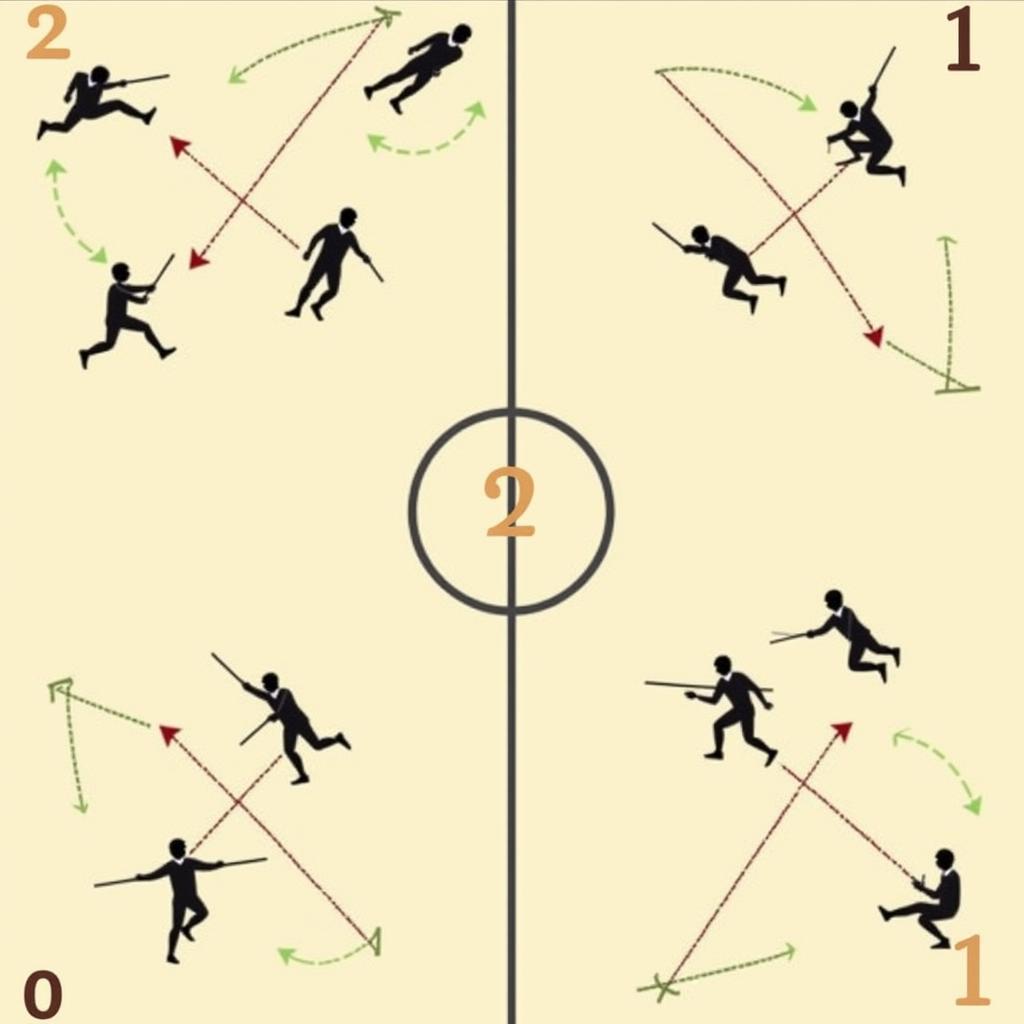Finding your perfect role in the wizarding world’s favorite sport depends on your strengths, skills, and playing style. Whether you’re a seasoned chaser or a curious newcomer, understanding the different quidditch positions is key to maximizing your potential on the pitch. What Position Am I In Quidditch? Let’s explore the roles, responsibilities, and qualities that define each one, helping you discover your place among the seekers, chasers, beaters, and keeper.
Understanding the Key Quidditch Positions
Quidditch, as any Potterhead knows, isn’t your average sport. With seven players on each team, flying broomsticks, and four different balls, it’s a complex and exhilarating game. Each position demands unique skills and contributes to the overall strategy.
Chaser: The Point Scorers
Chasers are the offensive powerhouses of quidditch, responsible for scoring points by throwing the quaffle through the opposing team’s hoops. They need to be agile fliers with excellent aim and the ability to work effectively as a team. A good chaser possesses a combination of speed, precision, and strategic thinking.
- Responsibilities: Scoring goals by throwing the quaffle through the hoops.
- Key Skills: Throwing accuracy, speed, teamwork, and strategic positioning.
Keeper: The Last Line of Defense
The keeper is the guardian of the hoops, preventing the opposing chasers from scoring. This position requires quick reflexes, strong defensive instincts, and the ability to command the area around the hoops. A keeper must be fearless and determined, ready to block any incoming quaffle.
- Responsibilities: Protecting the hoops and preventing the other team from scoring.
- Key Skills: Blocking, reflexes, agility, and communication.
Beater: The Bludger Bashers
Beaters wield bats to control the bludgers, two heavy balls that can knock players off their brooms. They protect their teammates from the bludgers while simultaneously targeting the opposing team. This role demands strength, accuracy, and strategic thinking.
- Responsibilities: Controlling the bludgers and protecting teammates from them.
- Key Skills: Batting accuracy, strategic thinking, and power.
Seeker: The Snitch Catcher
The seeker has arguably the most crucial role: catching the Golden Snitch. This small, elusive ball is worth 150 points and ends the game upon capture. Seekers need exceptional eyesight, agility, and unwavering focus to locate and catch the snitch amidst the chaos of the match.
- Responsibilities: Catching the Golden Snitch to end the game and earn 150 points.
- Key Skills: Speed, agility, sharp eyesight, and determination.
Which Quidditch Position Suits You?
Choosing the right quidditch position depends on your individual strengths and preferences. Are you a natural leader with a knack for strategy? Perhaps a chaser or keeper role is a good fit. Do you have lightning-fast reflexes and a sharp eye? Being a seeker might be your calling. Or maybe you enjoy a more defensive role, protecting your team and disrupting the opposition, making beater the ideal position.
“Aspiring quidditch players should focus on developing their core flying skills before specializing in a particular position,” advises Eldred Worple, renowned quidditch historian. “A solid foundation in broom handling and maneuverability is essential for success, regardless of your chosen role.”
Finding Your Place on the Team
No matter what position you choose, teamwork and communication are essential for success in quidditch. Each role is vital, and the team’s overall performance depends on the coordinated efforts of all seven players. Experimenting with different positions and practicing regularly will help you develop your skills and find your perfect place on the team.
 Quidditch Team Formation and Strategy
Quidditch Team Formation and Strategy
“The best quidditch teams are those that understand and utilize the unique strengths of each player,” adds Ms. Celestina Warbeck, renowned singing sensation and avid quidditch fan. “It’s not just about individual talent, but about how well the team works together as a cohesive unit.”
Conclusion
So, what position am I in quidditch? Ultimately, the answer lies within your own abilities and passions. By understanding the roles and responsibilities of each position, and by honing your skills through practice and dedication, you can find your perfect fit and contribute to the thrill and excitement of this magical sport. What position am I in quidditch? Hopefully, this guide has helped you answer that question.
FAQ
- How many players are there on a quidditch team? Seven.
- What are the four balls used in quidditch? Quaffle, two Bludgers, and the Golden Snitch.
- How many points is the Golden Snitch worth? 150 points.
- What does catching the Snitch do? It ends the game and awards the catching team 150 points.
- What is the role of the Chaser? To score goals with the Quaffle.
- Who protects the hoops in quidditch? The Keeper.
- What do Beaters do? They control the Bludgers and protect their teammates.
Quidditch Position Finder
| Position | Strengths Required | Key Skills |
|---|---|---|
| Chaser | Speed, Agility | Throwing, Teamwork |
| Keeper | Reflexes, Courage | Blocking, Communication |
| Beater | Strength, Strategy | Batting Accuracy |
| Seeker | Sharp Eyesight, Speed | Determination, Focus |
Common Quidditch Position Questions
- I’m fast and have good aim, which position should I try? Chaser or Seeker.
- I’m good at strategy and protecting others, which position is best? Beater or Keeper.
- I have great reflexes, which position suits me? Keeper.
- I’m determined and have a keen eye, which position should I consider? Seeker.
Further Reading
- Understanding Quidditch Rules and Regulations
- Advanced Quidditch Strategies for Beginners
- The History of Quidditch and its Evolution
Need more help? Contact us at Phone Number: 0902476650, Email: [email protected] Or visit us at: 139 Đ. Võ Văn Kiệt, Hoà Long, Bà Rịa, Bà Rịa – Vũng Tàu, Việt Nam. Our customer support team is available 24/7.





